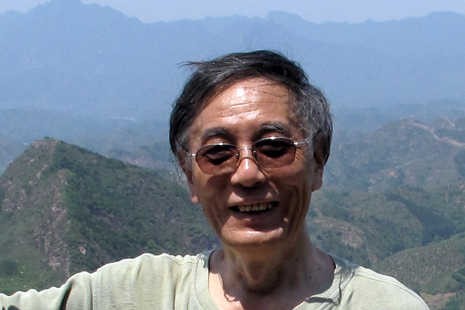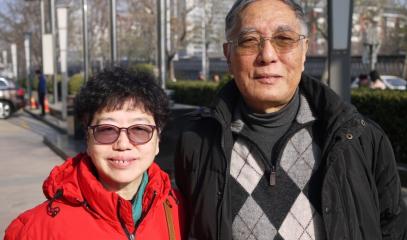In memory of Ren Yanli, friend and man of dialogue
Fr. Gianni Criveller remembers the Chinese academic who died in Beijing. "The son of militants who had done the Long March with Mao, he was proud of his studies at the Catholic University of Milan. He collaborated in the Cause for the beatification of Matteo Ricci. A man who symbolised a season of China's great openness towards faiths, now drastically reduced'.
Milan (AsiaNews) - Tomorrow, Tuesday 4th July, the funeral will be held in Beijing of Professor Ren Yanli (任延黎), 79 years old, an eminent scholar of Catholicism at the Research Institute of World Religions of the Chinese Academy of Social Sciences; and former director at the same Academy of the Office of Research on Christianity. The Academy of Social Sciences is the Chinese government's cultural and scientific laboratory, and is therefore of great importance and enjoys a fair amount of research freedom.
The news of his passing on 30 June last greatly shocked and saddened me. I was bound to Prof. Ren and his wife Wang Meixiu by friendship and affection. We collaborated with Prof. Ren on numerous occasions in Beijing, Hong Kong, Rome, Macerata, and Milan. He hosted me several times as a speaker at the Academy of Social Sciences and other academic institutions in the Chinese capital. In 1997, he generously engaged in organising a series of lectures by Neapolitan theologian Bruno Forte (now Archbishop of Chieti) at academic institutions in Beijing.
Prof. Ren was a member of the Commission for the beatification of Matteo Ricci at the diocese of Macerata (2010-2013), which I chaired. There were only two Chinese scholars on the commission, and Ren was the only non-Christian. I well remember the moment of the oath on the Bible, which of course was not asked of him (but he made a somewhat equivalent gesture). He diligently brought his contribution and our work was recognised with the recognition of Fr Ricci's heroic virtues by Pope Francis last 17 December, the act by which Ricci became Venerable.
I met Ren Yanli in 1994 in Beijing, thanks to Fr Angelo Lazzarotto, a PIME missionary, a true pioneer of contacts between China and Catholicism since the late 1970s. Fr Lazzarotto had facilitated Ren Yanli's admission to the Catholic University of the Sacred Heart in Milan, where he graduated with a thesis on the salvation of non-Christians according to the Second Vatican Council. Ren was very proud of his studies at the Catholic University, and maintained excellent relations with his lecturers.
Ren spoke Italian very well, furthering his knowledge of Catholicism, of which he became one of the foremost Chinese experts. Ren's knowledge of Italian and Catholicism allowed him frequent and in-depth contacts with those in the Vatican who were responsible for dialogue with China, including important cardinals. A Chinese priest familiar with this area confirmed to me how Ren had won esteem, respect and credibility for his sincerity, cordiality and tenacity both in China and in Rome.
Ren worked hard, unsparingly, to reconcile positions as different as those between China and the Vatican. He was a mediator, a man who united and not divided. And the field on which he moved was not without its pitfalls and difficulties. On the one hand the religious policy of the communist regime, so adverse and suspicious towards Catholicism, and on the other the Holy See's desire for dialogue and freedom for Catholics.
Ren Yanli had great respect for the Catholic faith and for the inescapability of the Roman primacy. He often told me of his struggle to help Chinese officials understand the concept "that Catholics are not Protestants, and therefore you cannot take the pope away from them". As Fides reported, Ren insisted that the faith of Chinese Catholics was a determining factor in making Chinese politicians understand the specificity of the Catholic Church and thus redirecting the intransigent line adopted for decades. On the other hand, Ren Yanli never encouraged Catholics to soften their principled positions, particularly on the role of the Roman Pontiff.
From the 1990s until a decade ago, centres for the study of Christianity flourished in China, led by so-called 'cultural Christians', i.e. scholars who were sympathetic to the Christian faith and adhered to it spiritually and ideally. Ren Yanli was not a 'cultural Christian', he was rather a scholar operating from within a government agency. Nevertheless, he participated in a season of China's great openness to faiths, and to Christianity in particular. And it is unfortunate to note that today this openness is drastically curtailed.
I personally owe a lot to Ren Yanli, whom I considered a loyal and sincere friend who did not fail to offer me advice, for my benefit, in difficult times. He hosted me in his home and told me about his life. His name Yan-li means 'the dawn of Yan': it means he was born in Yan-an (in the north of Shaanxi province) in 1944. As is well known Yan-an, a place now considered epic in the communist narrative, is the small town where Mao Zedong's Long March had ended and where the communist army reorganised in preparation for the struggle that would bring it to power in 1949. Ren Yanli was thus the son of communist militants who were very close to Mao and who made the legendary Long March with him. It was no small thing in communist China to boast of this origin.
As a young man, he was commissioned to study Italian, which he did with great success. However, the Cultural Revolution disrupted his and his superiors' plans, as it did for so many others who grew up within the Communist Party. After the Cultural Revolution he was allowed to continue studying Italian, and so it was that he came to Milan in the early 1980s.
He loved returning to Italy, and visiting his favourite gelaterias and pizzerias in Rome or Milan. But in recent years, his deteriorating health did not allow him to travel. Now, after contracting Covid, Prof. Ren Yanli has sadly passed away. My thoughts go with friendship to his wife, Wang Meixiu, who shared the study of Catholicism with her husband, and who also made significant contributions to the sympathetic understanding of Catholicism within the Academy of Social Sciences.
Last week Fr Jean Charbonnier, a missionary of the Missions Etrangères de Paris who dedicated his life to China and to weaving fragile threads of dialogue and presence, also passed away. It feels like an end to a season that was truly promising.
I think that Fr Lazzarotto, who is no longer able to write, shares my feelings. With Ren Yanli we not only lose a friend, whom we esteemed and who played a very significant role in the long years of our contacts with China. It is the very cause of dialogue between China and the Vatican that is losing a valuable friend. Never before have we needed men who unite and not divide; we need bridge-builders and not saboteurs. We need believers in the common humanity that unites men and women 'under the same heaven'. Many years ago Ren Yanli told me that he was not a believer. I don't know if anything inside him changed. But I hope with all my heart that the God of life will not be displeased with the existence of a good man, who spent himself for dialogue and good.
* PIME missionary and sinologist
16/11/2024 11:15
10/05/2023 11:35








.png)












